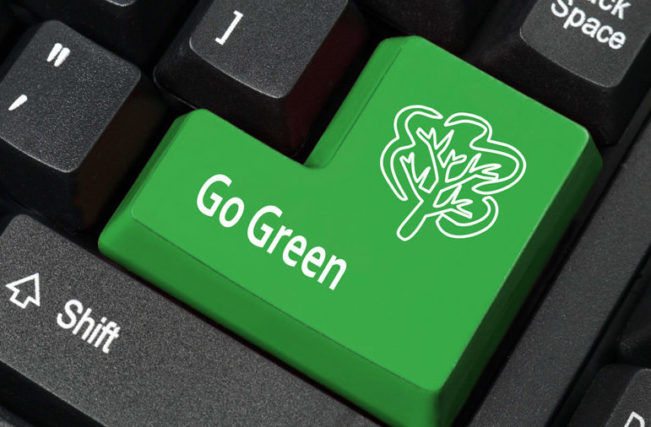

Energy
How to cut energy bills at the office, just like you would at home
Most people agree that conserving resources and saving energy is a good thing. We may have a recycling box and energy saving lightbulbs at home, and are super careful about not having the heating on any more than necessary. Lower energy bills are a great motivator, of course, as is the feeling of doing our bit to combat climate change. Couldn’t we do the same at the office?
With over 10 million office workers in the UK and the vast majority of our working week spent at the office, just think how much impact could be made if we adopted environmentally responsible behaviours at work.
Sadly, many offices make no more than a token effort to go green. Government legislation and regulations are primarily aimed at hazardous and industrial waste, with no formal pressure put on offices to even recycle – leaving it up to individual organisations to put environmental policies in place if they so choose.
From the actual floor space of your office rental, to simpler efforts like turning off equipment at night or questioning ‘do I need to print this’ – a little effort goes a long way when it comes to going green. So, if you want your office to make a concerted effort to become environmentally responsible, while reaping the financial benefits of saving energy – here are 3 areas where implementing simple changes should bring real rewards.
Office equipment
Did you realise that the energy used to power a computer monitor that’s left on overnight equates to the same amount of energy needed to laser print 800 pages? A photocopier left on all night wastes enough energy to print 1,500 copies. Here’s an easy win: make sure all computer equipment, including printers, photocopiers and scanners, is switched off at the end of every working day.
Of course, the convenience of office printers and photocopiers lies in the fact that they are available on demand. Newer energy saving models are available that automatically switch into stand-by mode when not in use, meaning up to 60% of energy can be saved during the working day, reducing electricity bills. If your office machines currently don’t have this feature, think about making automatic stand-by power consumption a priority when you next upgrade your hardware.
For small offices, consider the possibility of a multi-functioned machine that can print, copy and scan. With only one piece of equipment using power instead of 3 individual devices, the cost savings and lower environmental impact through the entire lifecycle of the machine are inarguably massive.
- Paper use
Did you know that the average office worker uses 10,000 sheets of copy paper every year, of which 6,800 sheets are wasted? According to recent statistics, every person in Britain consumes the equivalent of 4.48 trees every year. Those are truly shocking figures.
When it comes to printing and copying documents in the office, it’s worth asking yourself each time: is it really necessary or would an electronic copy or email be sufficient? And if you do need a hardcopy, could it be printed double sided, or at half size? Reducing the amount of paper used in the office not only makes good financial sense, it literally saves trees.
Paper recycling should be another easy win. However, unlike at home, where local councils will supply recycling boxes and organise regular disposal, companies generally need to take independent measures for this to happen. Rather than having to comply with regulations, it’s largely left up to individual businesses to put a recycling policy in place. As a minimum, your company should have a paper recycling box and
- Reuse paper for general use in the office, thereby saving on notepads and scrap paper. Many printers (check with manufacturers’ guidelines) will be happy to print on the other side, which is perfectly adequate for internal draft printouts.
- Recycle all paper containing sensitive information. Shredded documents can be used for compost or donated to pet stores or animal shelters as bedding.
- Lighting and heating
Were you aware that leaving the office lights on overnight wastes enough energy to heat water for 1,000 cups of tea? According to a recent survey, 94% of us turn the lights off at home to cut energy costs, but only 66% are bothering to do the same at the office. Again, the solution is, literally, blindingly obvious: ask the last person to leave the office to switch off the lights!
Electric heaters are notorious for gobbling up electricity, but you may not have realised that they also generate twice the amount of greenhouse gas compared to central heating. If you have electric heating at the office, it’s worth thinking about upgrading.
If your office is centrally heated, when was the last time anyone checked the central heating thermostat? Overheating the office by only few degrees each day could mean thousands of pounds a year spent on wasted energy. Did you know that by turning the thermostat down by just 1 degree can knock 10% off the cost of heating the office? And the best bit is you won’t even notice the difference in temperature!
There’s a lot of talk about ‘smart meters’ at the moment – they display how much energy your office is consuming and transmit the information directly to your energy supplier. If you’re keen to lower your office energy consumption, this information may be very useful. What’s more, it may give you a clearer idea of whether you’re paying over the odds for your energy bills, motivating you to switch suppliers in order to cut costs.
Many people assume creating an environmentally friendly office will be expensive – but it doesn’t have to be. Even small changes such as draught proofing door strips, heat saving window blinds and energy saving lightbulbs can make a real difference. Obviously, the more eco friendly measures have been taken, the lower your office energy bills will be. The Carbon Trust suggests that savings cut potentially be as much as 65%. Surely, that’s a cost saving that no business can afford to ignore?


 Environment12 months ago
Environment12 months agoAre Polymer Banknotes: an Eco-Friendly Trend or a Groundswell?

 Features11 months ago
Features11 months agoEco-Friendly Cryptocurrencies: Sustainable Investment Choices

 Features12 months ago
Features12 months agoEco-Friendly Crypto Traders Must Find the Right Exchange

 Energy11 months ago
Energy11 months agoThe Growing Role of Solar Panels in Ireland’s Energy Future





























